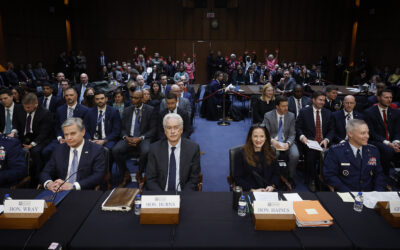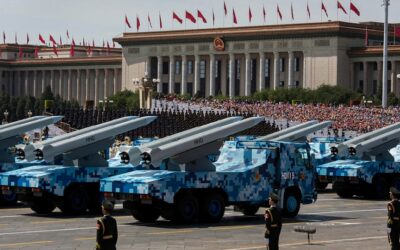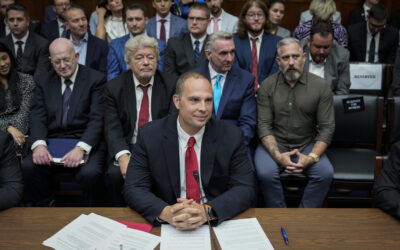
Ignore the Threat of Russian Intelligence Operations at Your Own Peril
SUBSCRIBER+EXCLUSIVE EXPERT PERSPECTIVE / OPINION — The Russian Intelligence Services are getting a lot of attention in the U.S. media these days. It makes sense. […] More

The Cipher Brief is honored to share the latest report from our friends at Business Executives for National Security (BENS) on Talent Management: A Strategy for Great Power Competition.
BENS is a nonpartisan group of private sector professionals who work to help identify best practices and help find solutions to the challenges faced by organizations in the national security space. BENS is led by CEO & President, Gen. Joseph Votel (Ret.), former CENTCOM Commander.
The Cipher Brief is proud to partner with BENS because we believe, as they do that national security requires the very best minds from both government and the private sector in order to innovate and advance the way we need to in the face of emerging threats.
This report is solely the work of BENS and you can link to the full Talent Management Report here.
INTRODUCTION
“People, partnerships, mission today, and mission tomorrow.” These are the four priorities that National Geospatial-Intelligence Agency (NGA) Director Vice Admiral Robert Sharp describes as essential in executing his agency’s mission and meeting 21st Century national security challenges.
“[Our] first priority is taking care of our greatest asset – our people…We’re concentrating on creating the environment where our people want to stay on the team – where they’re properly resourced, where their families are taken care of, where we’ve set the conditions for them to contribute, to grow, and to succeed, where barriers preventing them from ‘being all they can be’ are removed.”
Great power competition coupled with rapid technological innovation is forcing national security organizations to rethink the way they execute their missions. Foreign adversary efforts to gain advantage over the United States cut across all sectors of society. The complexity of today’s threats require national security leaders to build a workforce with the skills suited for the dynamics of the modern threat environment, as articulated in the National Defense Strategy.
To this end, national security agencies must develop a national security talent management strategy to effectively recruit, develop, and retain the best and brightest workforce possible, and is imperative in ensuring United States’ security today as well as preparing to prevail against threats tomorrow. Government leaders face challenges in recruiting the best talent, developing leaders among their workforce, and retaining their top performers. They have recognized a need to incorporate industry approaches to talent management to remain relevant and compete with domestic peers and foreign adversaries alike. BENS business leaders have recognized that the recommendations provided to agencies since 2018 could be broadly useful across the national security enterprise. For this reason, BENS was motivated to distill the common themes and insights from these efforts to help national security leaders build an effective talent management strategy for their organization.
Gen. Joseph Votel (Ret.), CEO & President, BENS

“Success and failure in the era of great power competition begins and ends with people. So, if the U.S. is to succeed, our national security enterprise will need to not only recruit but retain and empower our Nation’s best and brightest. The private sector has a blueprint for hiring and keeping top talent, and I believe it’s incumbent on our senior security leaders to compare and contrast their own HR model against it.”
EXECUTIVE SUMMARY
Tackling 21st Century challenges requires having a sustainable strategy to build a talented workforce for U.S. national security agencies. The national security enterprise, however, faces challenges recruiting the best talent, developing leaders, and retaining top performers. These challenges result, in part, from possessing a lack of rapidly evolving skillset needs coupled with heightened competition with foreign adversaries and private sector peers. In this context, national security agencies have consistently engaged BENS since 2018 to explore and implement best practices from industry to address their gaps in managing talent. Through these efforts, BENS business leaders have observed common threads in workforce queries raised by national security leaders. BENS has recognized the recommendations provided to agencies have broad application across the national security enterprise.
In this report, BENS distills the common themes and insights from these efforts to help national security leaders develop and implement a talent management strategy for their organization. Leaders in the national security community will bolster their organization’s effectiveness by developing a talent management strategy aligning with the mission, building in adaptability, and designed and executed with broad support from the workforce and other key stakeholders. Commitment to the strategy by agency leaders, managers, and employees is imperative for the overall success of the organization.
Everyone has a role to play ensuring the organization has the most skilled talent available. BENS’ work with national security agencies yielded the following eight best practices, which will help leaders develop a successful national security talent management strategy:
Tosh Barron, Vice Chair (Ret.), USAA & BENS Committee Member

“Whether one is a leader of a public or private corporation or one of the many important government national security organizations, it is imperative to strive for top talent in what is an increasingly competitive landscape. Giving priority to talent management strategy will only strengthen the organization and that, in turn, will attract future candidates.”
Heidi Steiger, Founder & CEO, Topridge Associates & BENS Committee Member

“Private sector approaches and best business practices can help national security agencies overcome difficulties in managing talent – issues related to hiring processes, resources, and institutional buy-in. Our work reveals the direct link between a talented national security workforce and US strategic competitiveness.”
Read also COVID lessons from SOF to Silicon Valley: A briefing with Gen. Joseph Votel (Ret.) only in The Cipher Brief
Read more expert-driven national security insights, perspective and analysis in The Cipher Brief
Related Articles

SUBSCRIBER+EXCLUSIVE EXPERT PERSPECTIVE / OPINION — The Russian Intelligence Services are getting a lot of attention in the U.S. media these days. It makes sense. […] More

SUBSCRIBER+ EXCLUSIVE REPORTING – In some ways, Wednesday’s House vote to ban or force the sale of the social media app TikTok was a landmark […] More

SUBSCRIBER+EXCLUSIVE REPORTING — The nation’s top intelligence agencies delivered a sobering threat assessment Monday, focused on spillover dangers posed by the wars in Ukraine and […] More

SUBSCRIBER+ EXCLUSIVE REPORTING – As drones of all types – aerial, land, and maritime – grow in number and sophistication, so do nightmarish scenarios about […] More

CIPHER BRIEF REPORTING — As a response to concerns about U.S. involvement in Chinese high-tech industries, President Biden this month signed an executive order that aims to […] More

CIPHER BRIEF REPORTING – A retired Air Force Intelligence Officer turned whistleblower testified before a House Oversight Committee on Wednesday that the U.S. government is not […] More
Search